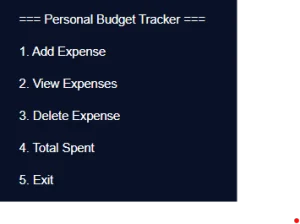Make a C# Personal Budget Tracker with Console UI and JSON
Keeping track of personal spending is crucial, and creating a budget tracker is a fantastic way for beginners to master C# file handling, serialization, and console user interface. This tutorial explains how to create a basic budget tracker that allows you to enter, view, and delete expenses as well as display your overall spending. It stores data in JSON.
Prerequisites
- .NET SDK installed
- Basic C# knowledge
- Visual Studio or any C# editor
1. Project Setup
2. Create the Expense Model (Expense.cs)
3. Add JSON Storage Helpers (Program.cs)
4. Console Application Logic (Program.cs)
Output Example

Extensions (Optional)
- Add monthly limits
- Use categories (e.g., food, rent)
- Export to CSV
- Convert to GUI using WPF or MAUI
Conclusion
This simple budget tracker project demonstrates how to use C# and JSON to manage personal finance data. It’s beginner-friendly and provides a strong foundation for learning file I/O, serialization, and structured application logic.
ASP.NET Core 10.0 Hosting Recommendation
HostForLIFE.eu
HostForLIFE.eu is a popular recommendation that offers various hosting choices. Starting from shared hosting to dedicated servers, you will find options fit for beginners and popular websites. It offers various hosting choices if you want to scale up. Also, you get flexible billing plans where you can choose to purchase a subscription even for one or six months.

